Discover the unique benefits of Moringa powder compared to other superfoods. Learn why Moringa stands out for its nutritional value and versatility in health and wellness routines.
Table of Contents
Introduction
Have you ever wondered what makes superfoods so “super”? With the health and wellness industry booming, superfoods have taken the spotlight. Among them, Moringa powder stands out as a unique and powerful contender. But what sets it apart from other superfoods? Let’s dive into the world of Moringa powder and explore what makes it truly special.
What are Superfoods?
Superfoods are nutrient-rich foods that are considered to be especially beneficial for health and well-being. They are packed with vitamins, minerals, antioxidants, and other nutrients that can help your body thrive. Superfoods are known for their high nutrient density, meaning they provide a substantial amount of nutrients and very few calories.
Popular Examples of Superfoods
You’ve probably heard of superfoods like kale, quinoa, chia seeds, and blueberries. These foods are celebrated for their health benefits and have become staples in many health-conscious diets. Each superfood offers its own unique set of nutrients:
- Kale: Rich in vitamins A, C, and K, as well as calcium and fiber.
- Quinoa: A complete protein containing all nine essential amino acids, along with fiber, iron, and magnesium.
- Chia Seeds: High in omega-3 fatty acids, fiber, and antioxidants.
- Blueberries: Packed with antioxidants, vitamins C and K, and fiber.
Superfoods are often included in diets to help promote overall health, prevent chronic diseases, and boost energy levels. They are an excellent way to enhance your diet with natural, nutrient-dense foods.
The Nutritional Profile of Moringa Powder
Vitamins
Moringa powder is a powerhouse of essential vitamins:
- Vitamin A: Important for vision, immune function, and skin health.
- Vitamin C: Crucial for immune support, skin health, and antioxidant protection.
- Vitamin E: Protects cells from oxidative stress and supports skin health.
- B Vitamins (B1, B2, B3, B6, and B12): Vital for energy production, brain function, and cell metabolism.
Minerals
This superfood is also a rich source of minerals:
- Calcium: Essential for strong bones and teeth, muscle function, and nerve transmission.
- Iron: Important for the production of hemoglobin and oxygen transport in the blood.
- Magnesium: Supports muscle and nerve function, blood sugar control, and bone health.
- Potassium: Regulates fluid balance, muscle contractions, and nerve signals.
- Zinc: Necessary for immune function, DNA synthesis, and wound healing.
Antioxidants
Moringa powder contains a variety of antioxidants that help protect the body against free radical damage:
- Quercetin: An antioxidant that may help lower blood pressure and reduce inflammation.
- Chlorogenic Acid: Known for its potential to regulate blood sugar levels and act as an anti-inflammatory agent.
- Beta-Carotene: A precursor to vitamin A and a powerful antioxidant that protects cells from damage.
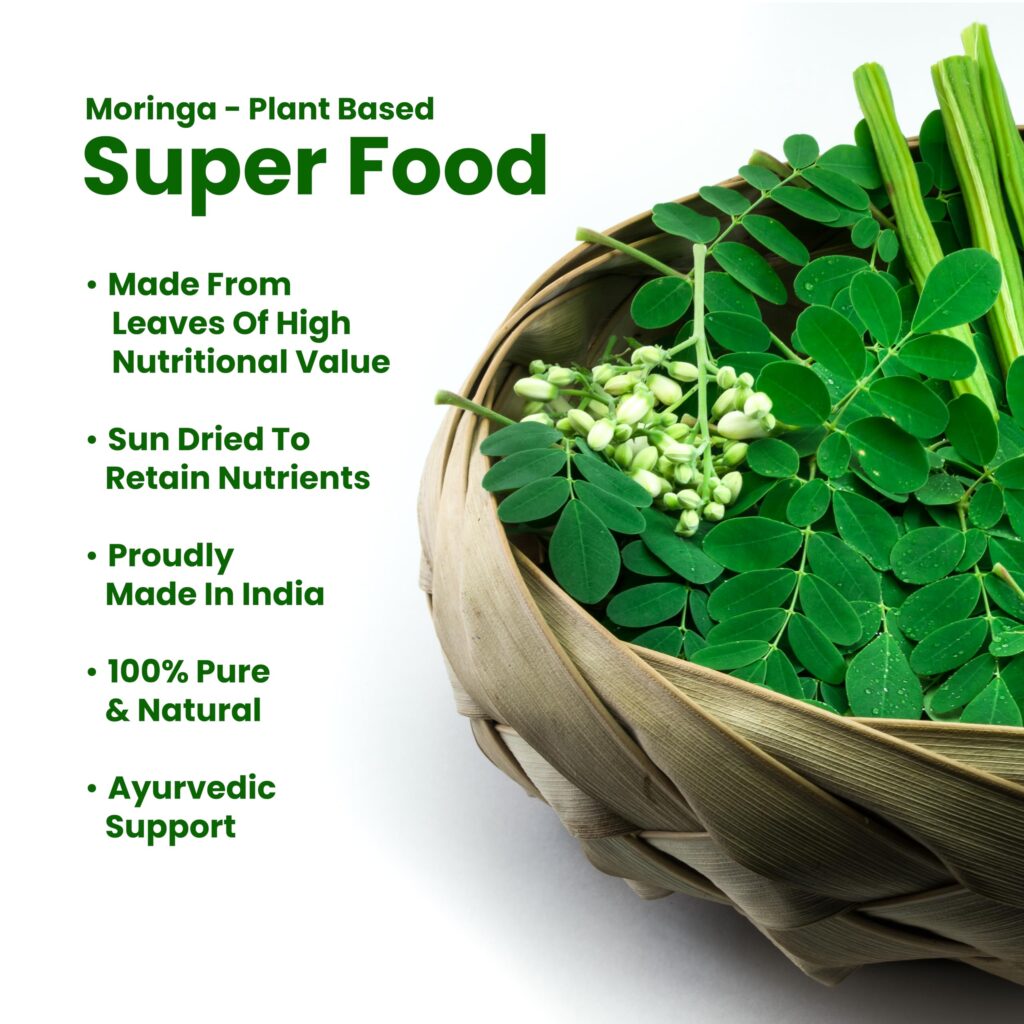
Amino Acids
Amino acids are the building blocks of proteins, and moringa powder contains all nine essential amino acids that the body cannot produce on its own:
- Leucine: Supports muscle protein synthesis and repair.
- Isoleucine: Helps in energy production and hemoglobin synthesis.
- Valine: Essential for muscle growth and tissue repair.
- Lysine: Plays a crucial role in collagen formation and immune function.
- Phenylalanine: Important for the production of neurotransmitters like dopamine.
- Threonine: Supports immune function and fat metabolism.
- Tryptophan: A precursor to serotonin, aiding in mood regulation and sleep.
- Methionine: Assists in detoxification and the metabolism of fats.
- Histidine: Necessary for growth and tissue repair, and the production of histamine.
Health Benefits
The rich nutritional profile of moringa powder translates into numerous health benefits:
- Boosts Immunity: The high levels of vitamins and antioxidants support a robust immune system.
- Enhances Energy Levels: B vitamins and amino acids help maintain energy production and reduce fatigue.
- Supports Bone Health: Calcium and magnesium are crucial for maintaining healthy bones and teeth.
- Improves Skin Health: Vitamins A, C, and E promote healthy skin by reducing oxidative stress and supporting collagen production.
- Regulates Blood Sugar: Chlorogenic acid and isothiocyanates in moringa help stabilize blood sugar levels, beneficial for managing diabetes.
Health Benefits of Moringa Powder
1. Boosts Immune System
Moringa powder is packed with vitamins A and C, which are crucial for a healthy immune system. Vitamin A supports the function of white blood cells, while vitamin C helps stimulate the production of antibodies, enhancing the body’s ability to fight infections.
2. Reduces Inflammation
The powder contains isothiocyanates, flavonoids, and phenolic acids, which have anti-inflammatory properties. These compounds help reduce inflammation in the body, potentially alleviating symptoms of chronic inflammatory diseases like arthritis.
3. Supports Healthy Blood Sugar Levels
Moringa powder has been shown to help regulate blood sugar levels. Compounds such as chlorogenic acid and isothiocyanates can improve insulin sensitivity and reduce blood glucose levels, making it beneficial for individuals with diabetes.
4. Improves Digestive Health
High in fiber, moringa powder aids in digestion and promotes regular bowel movements. It can help prevent constipation and support a healthy gut microbiome, contributing to overall digestive health.
5. Enhances Energy Levels
Rich in iron and essential amino acids, moringa powder supports the body’s energy production processes. Iron is crucial for the production of hemoglobin, which transports oxygen to cells, while amino acids help in muscle repair and energy metabolism.
6. Promotes Heart Health
Moringa powder contains potassium and magnesium, which are important for maintaining healthy blood pressure levels. The antioxidants in moringa also help reduce oxidative stress, a contributing factor to heart disease.
7. Supports Brain Health
The high levels of antioxidants, including vitamins C and E, protect brain cells from oxidative stress and damage. Additionally, the amino acid tryptophan in moringa aids in the production of serotonin, a neurotransmitter that regulates mood, sleep, and cognitive function.
8. Enhances Skin Health
Vitamins A, C, and E in moringa powder are essential for healthy skin. Vitamin A promotes cell turnover and collagen production, while vitamin C enhances collagen synthesis and protects against UV damage. Vitamin E acts as an antioxidant, preventing skin damage from free radicals.
9. Strengthens Bones
Moringa powder is a good source of calcium and phosphorus, which are vital for maintaining strong and healthy bones. These minerals help prevent osteoporosis and promote bone density.
10. Detoxifies the Body
Moringa powder has natural detoxifying properties due to its high content of antioxidants and chlorophyll. These compounds help eliminate toxins from the body and support liver function, aiding in the detoxification process.
Comparison with Other Superfoods
1. Moringa Powder vs. Spirulina
Nutrient Profile:
- Moringa Powder: Rich in vitamins A, C, E, B vitamins, calcium, iron, magnesium, potassium, and antioxidants like quercetin and chlorogenic acid.
- Spirulina: High in protein, vitamins B1, B2, B3, copper, iron, and antioxidants such as phycocyanin.
Health Benefits:
- Moringa Powder: Known for its immune-boosting, anti-inflammatory, and blood sugar-regulating properties.
- Spirulina: Praised for its high protein content, detoxifying effects, and ability to improve lipid and glucose metabolism.
Usage:
- Both can be added to smoothies, juices, or sprinkled on food, but moringa powder has a milder taste compared to the strong, earthy flavor of spirulina.
2. Moringa Powder vs. Matcha
Nutrient Profile:
- Moringa Powder: Contains a broad spectrum of vitamins and minerals, high in antioxidants.
- Matcha: High in catechins, particularly EGCG, vitamins A, C, K, and a moderate amount of caffeine.
Health Benefits:
- Moringa Powder: Provides comprehensive nutritional benefits, supports energy levels, and aids in reducing inflammation.
- Matcha: Known for its antioxidant properties, ability to boost metabolism, and enhance mental clarity due to caffeine and L-theanine content.
Usage:
- Moringa can be used in a variety of dishes, whereas matcha is typically consumed as a tea or added to baked goods and lattes for a caffeine boost.
3. Moringa Powder vs. Acai
Nutrient Profile:
- Moringa Powder: Offers a complete profile of essential nutrients including vitamins, minerals, and amino acids.
- Acai: Rich in antioxidants, especially anthocyanins, vitamins A, C, and fiber.
Health Benefits:
- Moringa Powder: Supports overall health with its diverse nutrient content, beneficial for energy, immune function, and bone health.
- Acai: Notable for its antioxidant capacity, which helps in fighting free radicals, and its potential to support heart health and aid in digestion.
Usage:
- Moringa powder is versatile and can be added to many dishes, while acai is often consumed in smoothie bowls, juices, or as a frozen puree.
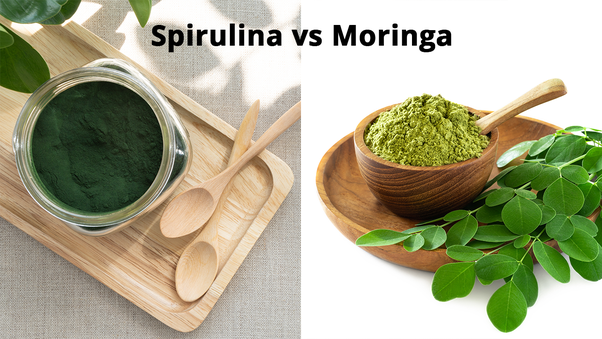
Unique Compounds in Moringa
1. Isothiocyanates
Isothiocyanates are compounds with potent anti-inflammatory, antimicrobial, and anticancer properties. They are derived from glucosinolates, which are abundant in moringa leaves. These compounds help in detoxification and protection against chronic diseases.
2. Quercetin
Quercetin is a powerful antioxidant flavonoid found in moringa powder. It helps in reducing blood pressure, lowering inflammation, and protecting cells from oxidative stress. Quercetin is also known for its antiviral and antihistamine properties, making it beneficial for immune support and allergy relief.
3. Chlorogenic Acid
Chlorogenic acid is a polyphenol with strong antioxidant and anti-inflammatory effects. It helps regulate blood sugar levels by slowing down the release of glucose into the bloodstream after a meal. This compound is also linked to weight loss and cardiovascular health benefits.
4. Kaempferol
Kaempferol is another flavonoid present in moringa powder. It has antioxidant, anti-inflammatory, and anticancer properties. Kaempferol helps protect against chronic diseases such as heart disease and cancer by neutralizing free radicals and reducing inflammation.
5. Rutin
Rutin is a bioflavonoid that enhances the body’s ability to utilize vitamin C and supports healthy blood circulation. It has anti-inflammatory, antioxidant, and antidiabetic effects. Rutin also helps strengthen blood vessels, reducing the risk of bleeding and improving cardiovascular health.
6. Beta-Sitosterol
Beta-sitosterol is a plant sterol with cholesterol-lowering properties. It helps reduce the absorption of cholesterol in the intestines, thus lowering blood cholesterol levels. Beta-sitosterol is also known for its anti-inflammatory and immune-modulating effects.
7. Zeatin
Zeatin is a type of cytokinin, a plant hormone that promotes cell division and growth. In moringa, zeatin is responsible for its anti-aging properties by promoting healthy cell regeneration and delaying the aging process. Zeatin also enhances skin health by stimulating collagen production.
8. Saponins
Saponins are naturally occurring compounds with strong antioxidant and immune-boosting properties. They help lower cholesterol levels, improve blood sugar control, and protect against cancer. Saponins also have antimicrobial properties, helping to fight infections.
How to Incorporate Moringa Powder into Your Diet
1. Smoothies and Shakes
One of the easiest ways to add moringa powder to your diet is by blending it into smoothies and shakes. Here’s how:
- Green Smoothie: Combine a handful of spinach, a banana, a cup of almond milk, a tablespoon of moringa powder, and a handful of ice. Blend until smooth.
- Fruit Shake: Blend together one cup of mixed berries, half a cup of yogurt, a tablespoon of moringa powder, and a splash of orange juice for a refreshing and nutritious shake.
2. Teas and Beverages
Moringa powder can be used to make a nutrient-rich tea or added to other beverages:
- Moringa Tea: Add a teaspoon of moringa powder to a cup of hot water, stir well, and let it steep for a few minutes. You can add honey or lemon for additional flavor.
- Juice Boost: Stir a teaspoon of moringa powder into your favorite fruit or vegetable juice.
3. Soups and Stews
Incorporate moringa powder into soups and stews for a nutritional boost:
- Vegetable Soup: Add a tablespoon of moringa powder to your homemade vegetable soup just before serving. Stir well to ensure it is evenly distributed.
- Stews: Mix a tablespoon of moringa powder into stews during the last few minutes of cooking.
4. Baked Goods
Enhance the nutritional content of your baked goods by adding moringa powder:
- Moringa Muffins: Add a tablespoon of moringa powder to your muffin batter. It pairs well with flavors like banana, blueberry, or zucchini.
- Energy Bars: Incorporate moringa powder into homemade energy bars along with nuts, seeds, and dried fruits.
5. Salads and Dressings
Sprinkle moringa powder over salads or mix it into dressings:
- Salad Sprinkle: Lightly sprinkle moringa powder over your favorite salad for an extra dose of nutrients.
- Moringa Dressing: Whisk together olive oil, lemon juice, a teaspoon of moringa powder, salt, and pepper to create a nutritious salad dressing.
6. Yogurts and Bowls
Add moringa powder to yogurt or breakfast bowls for a healthy start to your day:
- Yogurt: Mix a teaspoon of moringa powder into a cup of yogurt. Add honey and fresh fruit for added flavor.
- Breakfast Bowl: Sprinkle moringa powder over oatmeal, chia pudding, or acai bowls.
7. Pasta and Rice
Incorporate moringa powder into pasta dishes or rice:
- Pasta: Stir a teaspoon of moringa powder into your pasta sauce for added nutrition.
- Rice: Mix a tablespoon of moringa powder into cooked rice just before serving.
Potential Side Effects and Precautions
1. Digestive Issues
Consuming large amounts of moringa powder, especially on an empty stomach, may cause digestive upset such as nausea, diarrhea, or stomach cramps. It’s advisable to start with a small amount and gradually increase intake to assess tolerance.
2. Interactions with Medications
Moringa powder may interact with certain medications. It can enhance the effects of medications that lower blood pressure or blood sugar levels. If you are taking medications for diabetes, hypertension, or any other condition, consult your healthcare provider before using moringa powder.
3. Anticoagulant Effects
Moringa contains compounds that may have anticoagulant properties, meaning they can thin the blood and inhibit clotting. If you are taking blood-thinning medications such as warfarin or aspirin, discuss with your doctor before incorporating moringa powder into your diet to avoid potential interactions.
4. Allergic Reactions
Some individuals may be allergic to moringa. If you have allergies to other plants or tree nuts, you may have an increased risk of allergic reactions to moringa. Symptoms of an allergic reaction may include itching, rash, swelling, or difficulty breathing. Discontinue use and seek medical attention if allergic symptoms occur.
5. Pregnancy and Breastfeeding
There is limited research on the safety of moringa powder during pregnancy and breastfeeding. While moringa is traditionally used in some cultures to support lactation, it’s recommended to consult with a healthcare professional before using moringa powder if you are pregnant or breastfeeding.
6. Quality and Source
Ensure you purchase moringa powder from a reputable source to avoid contamination or adulteration. Organic and certified products are generally preferred to minimize exposure to pesticides or other harmful substances.
7. Individual Sensitivity
Individual responses to moringa powder can vary. Some people may experience mild detoxification symptoms initially, such as headaches or mild fatigue, as the body adjusts to the supplement.
Moringa Powder in Traditional Medicine
1. Nutrient Supplement
In traditional medicine, moringa powder is valued as a nutritional supplement due to its rich content of vitamins, minerals, and essential amino acids. It is often used to address nutritional deficiencies and support overall health, especially in populations with limited access to diverse food sources.
2. Anti-inflammatory Properties
Moringa powder is recognized for its anti-inflammatory properties. In traditional medicine, it has been used to alleviate symptoms of inflammatory conditions such as arthritis and joint pain. Compounds like isothiocyanates and flavonoids in moringa contribute to its anti-inflammatory effects.
3. Antioxidant Benefits
The high antioxidant content of moringa powder, including quercetin, kaempferol, and chlorogenic acid, makes it valuable in traditional medicine for combating oxidative stress and protecting cells from damage caused by free radicals. This antioxidant activity is believed to contribute to its anti-aging and disease-preventive properties.
4. Blood Sugar Regulation
Moringa powder has been traditionally used to help regulate blood sugar levels. Studies suggest that compounds like chlorogenic acid and isothiocyanates in moringa may improve insulin sensitivity and reduce blood glucose levels, making it beneficial for individuals with diabetes.
5. Immune Support
In traditional medicine practices, moringa powder is used to boost immune function and support overall immune health. Vitamins A, C, and E, along with other antioxidants present in moringa, help strengthen the immune system and protect against infections.
6. Digestive Aid
Moringa powder is known for its digestive benefits in traditional medicine. It has been used to promote digestion, alleviate constipation, and support gastrointestinal health. The fiber content of moringa aids in bowel regularity and supports a healthy gut microbiome.
7. Wound Healing
Topically, moringa leaves and powder have been used in traditional medicine for wound healing. The antibacterial and anti-inflammatory properties help cleanse wounds, reduce inflammation, and promote faster healing.
Modern Research and Validation
Modern scientific research has increasingly supported many of the traditional uses of moringa powder. Studies have validated its nutritional benefits, antioxidant and anti-inflammatory properties, and potential therapeutic effects on various health conditions. While more research is needed to fully understand its mechanisms and benefits, moringa continues to be recognized as a valuable medicinal plant with diverse applications.
Environmental Impact of Moringa Cultivation
1. Drought Resistance and Water Conservation
Moringa trees are well-adapted to arid and semi-arid climates and can thrive in regions with limited water availability. Their deep root system helps them access groundwater, reducing the need for irrigation compared to other crops. This characteristic makes moringa cultivation more sustainable in water-stressed areas.
2. Soil Improvement
Moringa trees have a symbiotic relationship with soil microbes that fix nitrogen, improving soil fertility. The fallen leaves of moringa act as a natural mulch, enriching the soil with organic matter and nutrients. This enhances soil structure and promotes better water retention, reducing soil erosion and improving overall soil health.
3. Carbon Sequestration
As trees, moringa plants contribute to carbon sequestration by absorbing carbon dioxide from the atmosphere during photosynthesis and storing carbon in their biomass. This helps mitigate climate change by reducing greenhouse gas concentrations in the atmosphere.
4. Biodiversity Support
Moringa trees provide habitat and food sources for various wildlife, including birds, insects, and small mammals. They contribute to biodiversity conservation by creating microhabitats within agricultural landscapes, thereby supporting local ecosystems.
5. Sustainable Agriculture Practices
Moringa cultivation often involves organic farming practices, reducing reliance on synthetic fertilizers and pesticides. This promotes sustainable agriculture by minimizing environmental pollution and preserving soil and water quality.
6. Economic Benefits to Communities
Moringa cultivation can provide economic opportunities for rural communities, especially in developing regions where the tree is native. By growing moringa for its nutritional and medicinal properties, farmers can diversify their income and improve livelihoods sustainably.
7. Renewable Energy Source
Moringa seeds contain oil that can be extracted and used as a biofuel. This offers a renewable energy source that can potentially reduce dependence on fossil fuels and contribute to sustainable energy solutions.
Consumer Tips for Buying Quality Moringa Powder
1. Source and Origin
- Organic Certification: Look for moringa powder that is certified organic. Organic certification ensures that the moringa leaves were grown without synthetic pesticides, herbicides, or fertilizers, minimizing exposure to harmful chemicals.
- Origin: Ideally, choose moringa powder sourced from reputable regions known for high-quality cultivation practices, such as India, the Philippines, or parts of Africa where moringa is native.
2. Processing Methods
- Low-Temperature Drying: Opt for moringa powder that has been dried using low-temperature methods. This helps preserve heat-sensitive nutrients and antioxidants, ensuring maximum nutritional content.
- Minimal Processing: Choose products that undergo minimal processing to retain the natural integrity of the moringa leaves and avoid additives or fillers.
3. Color and Freshness
- Vibrant Green Color: High-quality moringa powder typically has a vibrant green color. Avoid products that appear dull or discolored, as they may indicate poor quality or improper storage conditions.
- Freshness: Check the expiration date and packaging for signs of freshness. Properly stored moringa powder should maintain its potency and nutritional benefits over time.
4. Purity and Transparency
- Purity Testing: Look for moringa powder that undergoes third-party testing for purity and quality. This ensures that the product is free from contaminants such as heavy metals, microbial pathogens, and pesticides.
- Transparent Labeling: Read the product label carefully to understand its ingredients and any additional information about sourcing, processing methods, and certifications. Transparent labeling builds trust and confidence in the product’s quality.
5. Reviews and Reputation
- Customer Reviews: Check customer reviews and testimonials to gauge the quality and effectiveness of the moringa powder from other consumers.
- Reputable Brands: Purchase from reputable brands or suppliers known for their commitment to quality and ethical sourcing practices. Trusted brands often provide detailed information about their products and manufacturing processes.
6. Sustainable Practices
- Environmental Impact: Consider supporting brands that prioritize sustainable and ethical practices in moringa cultivation. This includes practices that promote biodiversity, conserve water resources, and support local communities.
Source to Get Organic Moringa Leaf Powder Capsules
| Moringa Leaf Powder Capsules |
| Organic Moringa Leaf Powder Capsules |
| Best Moringa Leaf Powder Capsules |
| High-quality Moringa Powder Capsules |
| Affordable Moringa Powder Capsules |
FAQs
What does Moringa powder taste like?
Moringa powder has a slightly earthy, green taste. Some describe it as similar to spinach or matcha, but it can easily be masked by adding it to smoothies or other flavorful dishes.
Can I take Moringa powder daily?
Yes, you can take Moringa powder daily. It’s recommended to start with a small amount, such as one teaspoon, and gradually increase to one tablespoon as your body adjusts.
How does Moringa powder help with weight loss?
Moringa powder can aid in weight loss by boosting metabolism and providing essential nutrients that support energy levels and overall health. Its high fiber content also helps promote feelings of fullness.
Is Moringa powder safe for children?
Moringa powder is generally safe for children in small amounts. However, it’s best to consult with a pediatrician before adding it to a child’s diet.
Where can I buy Moringa powder?
You can buy Moringa powder at health food stores, online retailers, and some grocery stores. Look for reputable brands that offer high-quality, organic Moringa powder.
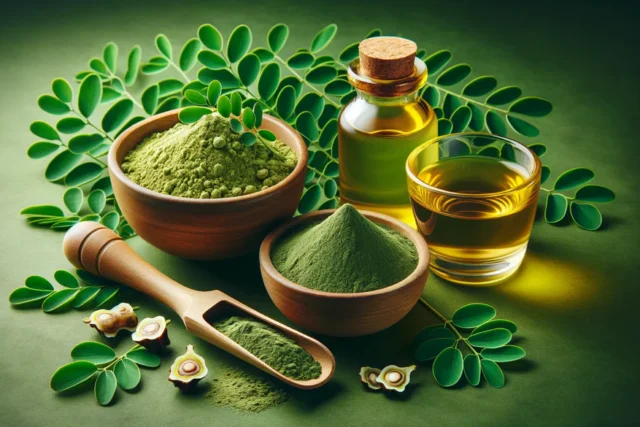
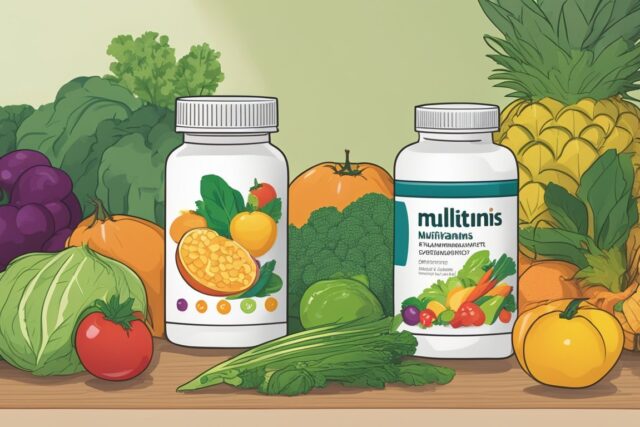
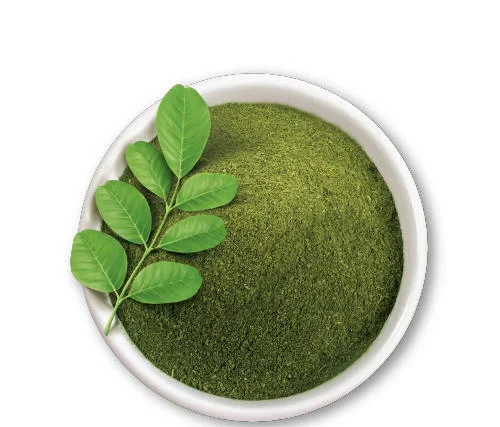
MOST COMMENTED
Animal-Based Proteins / Casein Protein / Dietary Protein / High-Protein Diets / Pea Protein / Plant-Based Proteins / Protein / Protein Deficiency / Protein Supplements / Proteins / Whey Protein / Whey Proteins
Is Protein Powder Safe for Teenagers and Children?
Animal-Based Proteins / Casein Protein / Dietary Protein / High-Protein Diets / Pea Protein / Plant-Based Proteins / Protein / Protein Deficiency / Protein Supplements / Proteins / Whey Protein / Whey Proteins
Unlock the Power of Proteins for Optimal Gut Health
Multivitamin
Total Health: Multivitamin for Active Lifestyles
Multivitamin
WellnessFusion: Complete Multivitamin Support
Dietary Supplement
Revitalize Your Health: The Magic of Red Yeast Rice Capsules
Foot care / Foot Health
Revitalize Your Foot Care Routine: Essential Tips for Optimal Foot Health
Foot Problem / Diabetics / Foot Health
Diabetics: Mastering Footwear Selection for Enhanced Foot Health and Ultimate Comfort
Exercises and Footwear Tips for Hammertoe Relief / Foot care / Foot Health / Foot Pain / Foot Problem / Hammertoes
Unlock Effective Exercises and Footwear Tips for Hammertoe Relief
Hammertoes / Foot Health / Foot Pain / Foot Problem
Unlock Relief: Essential Guide to Hammertoes Causes, Symptoms, and Treatments
Foot Problem / Foot Health
Revolutionize Your Recovery: Natural Remedies for Plantar Fasciitis – Fresh Home Keepers